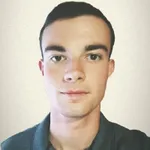
Robin Ohs
PhD Student & Developer
Researching Space Networks and Sustainability in Computing
👋 Hi, I'm Robin!
I am a Ph.D. student at the Dependable Systems and Software chair at Saarland University in Germany, under Dr.-Ing. Andreas Schmidt and Prof. Dr. Holger Hermanns.
With a passion for web development and space technologies, my journey began with a Bachelor's in Cybersecurity, where I focused on generating automated software tests for Android applications. Between my bachelor's and master's, I worked on a scrum team at the German Air Force, gaining experience with agile software development, continuous integration, and tools like Jira and Confluence.
During my master's, I developed a satellite energy simulator, contributed to a Rust library for resource-aware applications, and implemented a system daemon for carbon-aware operating systems. Now, as a Ph.D. student, I research space networks and sustainable computing.
📡 Academic Experience
- 2023-Now - PhD student
- 2021-2023 - Master of Science in Computer Science (UdS)
- 2017-2020 - Bachelor of Science in Cybersecurity (UdS)
- 2017 - A-Levels (Abitur)
🚧 Working Experience
- 2023-Now - PhD student (UdS)
- 2023 - Research Assistant (UdS)
- 2021-2022 - Research Assistant (UdS)
- 2020-2021 - Developer (German Air Force)
🌎 Travel
I have been lucky enough to visit the following fantastic countries:
- 🇦🇷 Argentina
- 🇦🇹 Austria
- 🇧🇷 Brasil
- 🇧🇪 Belgium
- 🇧🇬 Bulgaria
- 🇨🇿 Czechia
- 🇫🇷 France
- 🇩🇪 (Germany)
- 🇬🇷 Greece
- 🇮🇹 Italy
- 🇱🇮 Liechtenstein
- 🇱🇺 Luxembourg
- 🇳🇱 Netherlands
- 🇪🇸 Spain
- 🇨🇭 Switzerland
- 🇺🇸 United States
⏰ My Local Time
In 🇩🇪 we currently have:
- --:--:-- ---
👷 My Projects
2025
phantomlink is a tool for studying the impact of a dynamic network environment on the performance of internet protocols and applications. Written in safe Rust, the tool makes use of Linux network namespaces and virtual Ethernet devices to simulate a realistic end-to-end link. Using simple .csv scenario files, it is possible to define the time-evolving virtual link parameters, including delay, data rate over time, and route changes. Since the tool just opens two connected vEth in different namespaces, it is possible to combine phantomlink with any application, such as the well-known tools like netcat or iperf but also your own custom application. With the ability to reorder, delay, pace, and drop packets, phantomlink can be used to test network behavior under various scenarios.
2024
carbond is an operating-system daemon designed for carbon awareness. It monitors and manages the carbon footprint of computing systems by tracking energy consumption and providing insights into the environmental impact of software operations. The daemon provides the grid intensity for the system by considering common physical inefficiencies such as the PSU. Additionally, it has the capability to track the carbon intensity of a built-in internal battery. This project is part of an effort to promote sustainable and eco-friendly computing practices.
2023
FLoRaSat (Framework for LoRa-based Satellite networks) is a comprehensive framework designed for simulating LoRa-based satellite networks. Built on the Omnet++ discrete-event simulator, FLoRaSat enables detailed end-to-end simulations for satellite Internet of Things (IoT) applications. The framework adapts LoRa and LoRaWAN protocols specifically for space communications, allowing researchers and developers to analyze and optimize satellite network performance. Additionally, it has the capability to research routing algorithms for Low Earth Orbit (LEO) satellite constellations, making it a versatile tool for studying and enhancing satellite IoT systems.
totp-kt is a Kotlin library designed for implementing HOTP and TOTP (time-based one-time passwords) in your applications. It offers support for generating and validating 2-factor authentication codes, creating recovery codes, and generating secure random secrets. The library is useful for enhancing the security of your applications by providing a reliable method for two-factor authentication..
📃 My Publications
2025
Robin Ohs, Gregory F. Stock, Andreas Schmidt, Juan A. Fraire, Holger Hermanns
IN: 4th Workshop on Sustainable Computer Systems (HotCarbon)
Robin Ohs*, Gregory F. Stock*, Juan A. Fraire, Holger Hermanns, Andreas Schmidt
IN: Applied Networking Research Workshop
* authors contributed equally
Alexander Y. Choquenaira-Florez, Robin Ohs, Juan A. Fraire, Hervé Rivano
Robin Ohs, all authors of the Dagstuhl Seminar 24351
IN: Power, Energy, and Carbon-Aware Computing on Heterogeneous Systems (PEACHES)
2024
Robin Ohs, Henry Janson, Andreas Schmidt, Luis Gerhorst, Benedict Herzog, Timo Hönig
IN: The 15th International Green and Sustainable Computing Conference
Quantitative analysis of segmented satellite network architectures: A maritime surveillance case study
Juan A. Fraire, Santiago Henn, Gregory Stock, Robin Ohs, Holger Hermanns, Felix Walter, Lynn Van Broock, Gabriel Ruffini, Federico Machado, Pablo Serratti, Jose Relloso
2023
Andreas Schmidt, Gregory Stock, Robin Ohs, Luis Gerhorst, Benedict Herzog, Timo Hönig
IN: 2nd Workshop on Sustainable Computer Systems (HotCarbon)